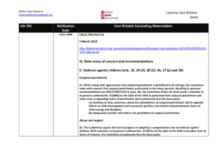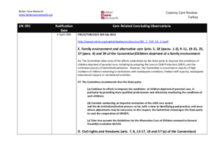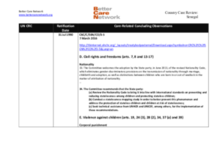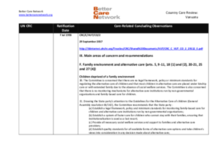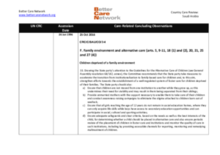Displaying 381 - 390 of 1798
This chapter from the book Re-Visioning Public Health Approaches for Protecting Children, drawing on recent international empirical research, illustrates the perspectives of key stakeholders in the child welfare and protection services: Children, caregivers and practitioners. It shows that while there is an awareness of what children and families require in order to lead supported and healthy lives, the current system is challenged in its attempts to adequately address their needs due to its forensic and highly regulated orientation.
In this chapter from the book Re-Visioning Public Health Approaches for Protecting Children, the authors critically examine the practical and organisational issues as well as the ideational and procedural ones that challenge policy makers, leaders and those delivering services as they attempt to re-focus child protection service delivery toward earlier intervention and prevention within a public health framework.
This chapter from the book Leaving Care and the Transition to Adulthood explores progress towards realizing the rights of young people in and leaving out of home care in Australia, Sweden and the UK.
This literature review examines research on the outcomes and experiences of Hispanic families in the US child welfare system and how case characteristics interact with the experiences of Hispanic families.
The authors of this article reflect on the recently published Care Crisis Review 2018, a sector‐led review, which examines the reasons for the rise in care proceedings and the number of children in care.
This country care review includes the care-related Concluding Observations adopted by the Committee on the Rights of the Child and the Committee on the Rights of Persons with Disabilities.
This country care review includes the Concluding Observations for the Committee on the Rights of the Child and the Committee on the Rights of Persons with Disabilities. The Committees' recommendations on the issue of Family Environment and Alternative Care as well as other care relevant issues are highlighted.
This country care review includes the care-related Concluding Observations adopted by the Committee on the Rights of the Child and the Committee on the Rights of Persons with Disabilities.
This country care review includes the care-related Concluding Observations adopted by the Committee on the Rights of the Child and the Committee on the Rights of Persons with Disabilities.
This country care review includes the care-related Concluding Observations adopted by the Committee on the Rights of the Child and the Committee on the Rights of Persons with Disabilities.

